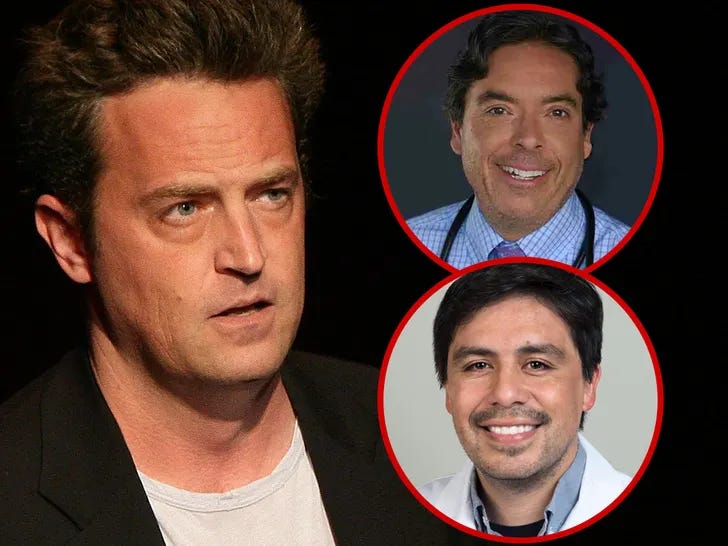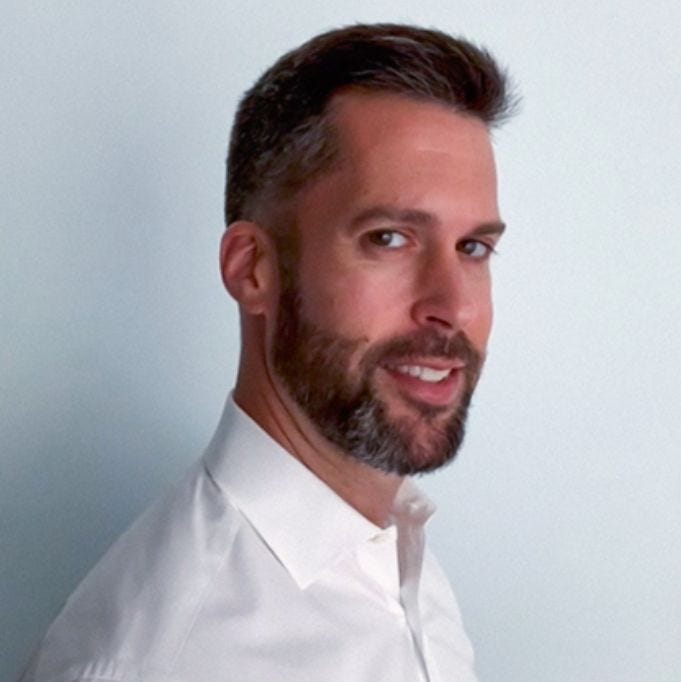DEA compares ketamine industry to opioid epidemic
Anne Milgram says the DEA is going after over-prescribing doctors. How exactly?

‘It sounds like the DEA hammer will be coming down hard in coming months. That would include $18k fines for bad documentation and processes. It will definitely strike fear into the heart of prescribers.’ - A ketamine psychotherapist
The head of the Drug Enforcement Agency (DEA), Anne Milgram, has compared the ketamine market to the early days of the opioid epidemic, and said the government agency is going after ketamine doctors and nurses who unscrupulously over-prescribe the drug.
Milgram spoke on CBS’ Meet the Nation on Saturday, following last week’s arrests of five people, including two doctors, following the death of Friends actor Matthew Perry from a ketamine-related drowning in October 2023. Milgram said:
It started with two unscrupulous doctors who were violating their oath to take care of patients and instead supplying enormous amounts of ketamine for huge amounts of money. This, unfortunately, is a tragic process that we have seen, thinking back to the beginning of the opioid epidemic, where many Americans became addicted to controlled substances in doctors’ offices and through medical practitioners that then turned into street addiction as well.
Milgram promised a DEA crackdown on unscrupulous prescribing:
At DEA we’re focused on doctors, nurse practitioners, anyone who is essentially diverting legitimate controlled substances from the normal medical practice to do what we saw happening here, where these doctors were not evaluating Matthew Perry, they were not supervising injections. They were leaving behind vials of ketamine for Matthew Perry to be injected by his assistant.
Two bad doctors and a ketamine queen
Last week, the DEA arrested five people for their involvement in Perry’s illegal and fatal ketamine habit, including a Hollywood drug-dealer apparently known as ‘the ketamine queen’ and two doctors - Santa Monica doctor Salvador Plasencia, and San Diego doctor Marc Chavez.
Dr Chavez described himself as ‘the Health MD’ and a ‘concierge’ for functional health and longevity. He used to be a partner in Dreamscape Ketamine and Wellness, a San Diego ketamine clinic, but left, and then falsely represented himself as still working there to wholesale pharmacists in order to obtain ketamine to sell at a high price to Matthew Perry. “I wonder how much this moron will pay,” Plasencia said in a text message to Chavez, according to the Department of Justice indictment.
The ketamine boom
The ketamine market has grown rapidly in the last few years, both legally and illegally. Ketamine was approved as an anesthetic by the FDA in the 1970s. Since then it has become used as an off-label treatment for mental illnesses and pain through IV infusions and lozenges. Its popularity has surged in the last few years, partly as an alternative pain medication to opioids, and partly as part of the craze for all things ‘psychedelic’.
The number of ketamine clinics in the US has grown from less than 20 in 2018 to somewhere between 500 and 800 clinics today. During the pandemic, federal rules on home prescriptions of controlled substances were relaxed, leading to the rise of home-delivery ketamine companies like Mindbloom, which recently started home-delivery of ‘ketamine injectables’.
Profits from ketamine grew from $8.3 million in 2017 to $185 million in 2022, according to this video report from the WSJ. Marketwatch estimates the global ketamine market will grow from $132 million in 2021 to $3.8 billion by 2027. Most of this market is off-label and unregulated by the FDA. However, the FDA did approve Johnson & Johnson’s product Esketamine (known as Spravato in its nasal spray form) for depression. Esketamine made J&J $206 million in Q4 2023.
Regulators’ growing concerns
The rise of off-label ketamine use has led to a national shortage of FDA-approved ketamine supplies, and to the rise of ketamine made by compounded pharmacists outside of FDA supervision and control. Regulators at the state and federal level are concerned.
Dr Lisa Robin, Chief Advocacy officer at the Federation of State Medical Boards , speaking at a recent Reagan-Udall conference on ketamine, said:
The proliferation of these business models have outpaced what the regulatory system can support. States have gone through this during the opioid crisis as pain clinics, or pill mills as they were referred to then, were proliferating until they had to have some [stricter] requirements and protections. And then telemedicine adds a whole other level. Since COVID, we’ve seen such a proliferation, with thousands and thousands of prescriptions for ketamine going all over the country. We have a real problem in some states because there is a proliferation of these clinics and many of them are not doing good medicine, and not having much oversight, if any. We don't have time just to do nothing. There's going to be some bad outcomes. It’s the Wild West.
The FDA warned about non-FDA-approved compounded ketamine leading to adverse events in October 2023. Dr Gail Bourmel, director of the FDA, speaking at the recent Reagan-Udall conference, said:
About five or six years ago, we started seeing a lot of adverse events related to compounded ketamine…We have concerns we're starting to see a shift in standard of care. I have anesthesiologists and nurses wanting to get licensed and establishing an IV clinic inside a gym, or in their own little mobile clinic. ‘Let’s do a little spa party’. I recently heard a concern where they're doing a psychedelic event where they do therapies such as yoga, and then they say, "Hey, if anybody wants an IV ketamine infusion, we have it’. But how's the patient supposed to know if it's safe and who's doing it? What’s the monitoring?
Industry and patients concerned by the backlash
Perry drowned in his pool after taking a high dose of ketamine in October 2023. When his autopsy was released in December, the ketamine industry briefed the media that this was an incident of illegal recreational abuse entirely unconnected to the medical ketamine industry. Perry ‘did himself in’, in the words of Dr Phil Wolfson, a leading ketamine provider. Industry experts assured journalists that ketamine was safe and most articles didn’t mention that the drug could be addictive.
It has now emerged that Perry’s initial medical use of ketamine led to illicit abuse, aided by unscrupulous physicians aiming to profit from his addiction. Now, ketamine industry spokespeople say what’s needed is a crackdown on ‘bad actors’, including telehealth providers.
Sam Mandel, CEO of Ketamine Clinics Los Angeles (KCLA), tells me:
Comparing ketamine to the opioid epidemic is dangerously misleading – opioids are causing addiction and fatalities at a rate so much exponentially higher you cannot compare the two. Additionally, it's crucial to distinguish between different forms of ketamine and ketamine providers. Online prescribers sending ketamine troches/lozenges or nasal sprays to people to take at home unsupervised after minimal screening are worlds apart from clinics like KCLA, where treatments are provided in a safe, nurturing environment under direct medical supervision. We need to distinguish between legitimate ketamine providers and unscrupulous practitioners and the black market. What we really need is better enforcement of existing rules to weed out bad actors.
Sandhya Prashad MD, president of the Association of Ketamine Physicians, Psychotherapists and Practitioners (an industry body with around 500 members), says:
Further regulation and guardrails are certainly required. However, it is important to understand that ketamine is the only anti-suicidal / immediately lifesaving treatment within psychiatry currently that is also backed by well-conducted, rigorous trials from major academic institutions, and is a major advancement in a field where other treatments have a very low rate of response. When administered correctly and with supervision, ketamine is often one of the only solutions for patients suffering from chronic suicidality, treatment resistant depression, PTSD and chronic pain. It is imperative to balance the risks and benefits and create clear guardrails so that it can remain safe and accessible to patients who need it.
On the Reddit page for ketamine therapy, patients responded to the DEA’s comments with concern:
‘I just started with regular ketamine (low dose nasal spray) and I’m so scared I’ll lose it at some point. It’s been a godsend.’
‘Same here. It's the first time I've felt ok in years. I can't even read this article I'm so upset that it might be taken away and I have to go back to the living nightmare that is depression.’
‘They took away the fentanyl. They’re taking away the oxycodone. Ketamine is next. Chronic pain patients are being boiled like frogs.’
But some in the industry say a crackdown is overdue. Steve Levine MD is senior vice president of Patient Access and Medical Affairs at Compass Pathways and previously founded Actify, a ketamine psychotherapy provider. Steve stepped away from the ketamine industry after he became increasingly concerned about unscrupulous practices. He says:
I expected some of this to happen two or three years ago. I’m really surprised it’s taken this long. I became worried [about the market] as early as 2017, when we were seeing more and more non-mental healthcare practitioners getting into this space, thinking it would be a good business. But particularly during the pandemic when so much moved to telehealth, and a couple of bad actors hopped on that and really took things in a mass-market, minimal-supervision, send-you-as-much-ketamine-as-you-want direction. One of them has now started advertising home injectables on social media. Real bad idea.
‘I expected some of this to happen two or three years ago. I’m really surprised it’s taken this long’ - Steve Levine
Richard Dart, Director of the Rocky Mountain Poison and Drug Center, also recently warned of parallels between the opioid epidemic and the ketamine off-label market:
The parallels between the history of opioid analgesics and ketamine use today are concerning. Like opioid medications in the 1990s, changes in medical practice have resulted in increasing medical use of ketamine. This increase in use is associated with an increase in misuse. Each has become the focus of commercialized high-volume outpatient clinics that prescribe or administer the medication Although some practitioners claim the contrary, evidence suggests that ketamine causes dependence, and withdrawal symptoms occur after cessation of chronic use.
What is likely to happen to the industry?





